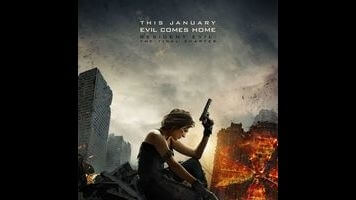The Final Chapter is a weak retread of Resident Evil’s greatest hits

It’s a shame that the zombie-mowing, monster-bashing post-apocalyptic Resident Evil series should end on a bum note, with one of its weakest entries; whether taken as guilty pleasures or as termite art, these movies are the only good thing to have come out of the early 2000s craze for schlocky video-game adaptations. They’re terrifically entertaining, boasting a capable pulp heroine in Milla Jovovich’s wasteland-roving Alice and an action-to-downtime ratio that makes most of their genre competitors look like pretentious twaddle. Jovovich’s husband Paul W.S. Anderson produces, writes, and directs most of them, and he’s a disreputable, utterly sincere sci-fi stylist whose dogged commitment to filming corridors, urban wastelands, and anything reminiscent of Aliens (including, yes, Alien Vs. Predator) eventually metastasized into a set of narrative themes. But behind these strong B-movie values is a series that begs to not be read literally—a mirror maze of internal metaphors, self-reflected through the mutations, clones, resurrections, simulations, memory wipes, and Lewis Carroll references that make up its continually reformulated and retconned backstory. Anderson is an artist of zombiod head-shots and secret testing facilities, and Jovovich is his muse.
But they can’t all be masterpieces, can they? Anderson has never been a bigger-is-better filmmaker, so for Resident Evil: The Final Chapter, the grand finale of the franchise he’s shepherded for 15 years, he simply opts to return to the setting of the first film with another Aliens-inspired ticking-clock structure. This time around, Alice joins forces with her arch-nemesis, the artificial intelligence known as the Red Queen (Jovovich and Anderson’s daughter, Ever Anderson), who has decided to finally turn on the villainous, mutagen-making Umbrella Corporation and its diverse portfolio of global conspiracies. That means a return trip from the catastrophic ruins of Washington, D.C. to the nuclear blast zone of Raccoon City and the remains of the massive underground laboratory called the Hive. (The climactic last stand of human survivors against the grotesque undead teased at the end of Resident Evil: Retribution has been relegated to an opening info-dump that doubles as an act of audience gas-lighting.) Mutated dogs, deadly laser grids, guns with supernumerary barrels, unnecessary motorcycle stunts, corporate secrets, scenes transitioned through wireframe maps—all of the series’ greatest hits are here.
The volume of stuff isn’t helped by the fact that The Final Chapter is cut much, much faster than any of Anderson’s previous films, by the memorably named Doobie White, a longtime associate of Crank: High Voltage directors Mark Neveldine and Brian Taylor. Combining Anderson’s symmetrical camera style with frenetic editing ends up imploding the sense of depth and space that has long made the director’s movies must-sees in 3-D. The breathless pace even suffocates a couple of third-act plot twists, robbing one of its potential poignance and the other of its subversive political subtext. But the rapid-fire aesthetic has its moments—namely, a highway battle that shows the influence of Mad Max: Fury Road and a crazed, fiery siege sequence that pits Alice and a group of Raccoon City survivors against an easily distracted army of hungry zombies that seems to number in the hundreds of thousands. It seems significant that the shambling undead—the single easiest can’t-miss metaphor in the bestiary of horror—hold almost no interest for Anderson, except as a generic threat.
No, in his films, location is plot, but it’s also subtextual and psychic—all those death traps, trap doors, labyrinths, and escape hatches. Here, for the very first time, he skirts incoherence. Still, as a writer he can be relied on for at least one memorably pulpy, self-reflexive turn of phrase per film. Here, a corporate villain addresses his board of executive co-conspirators, telling them of his plan for a post-plague Earth: “We can reboot it in our image.” Sometimes, you can’t help but think that these movies are about art.